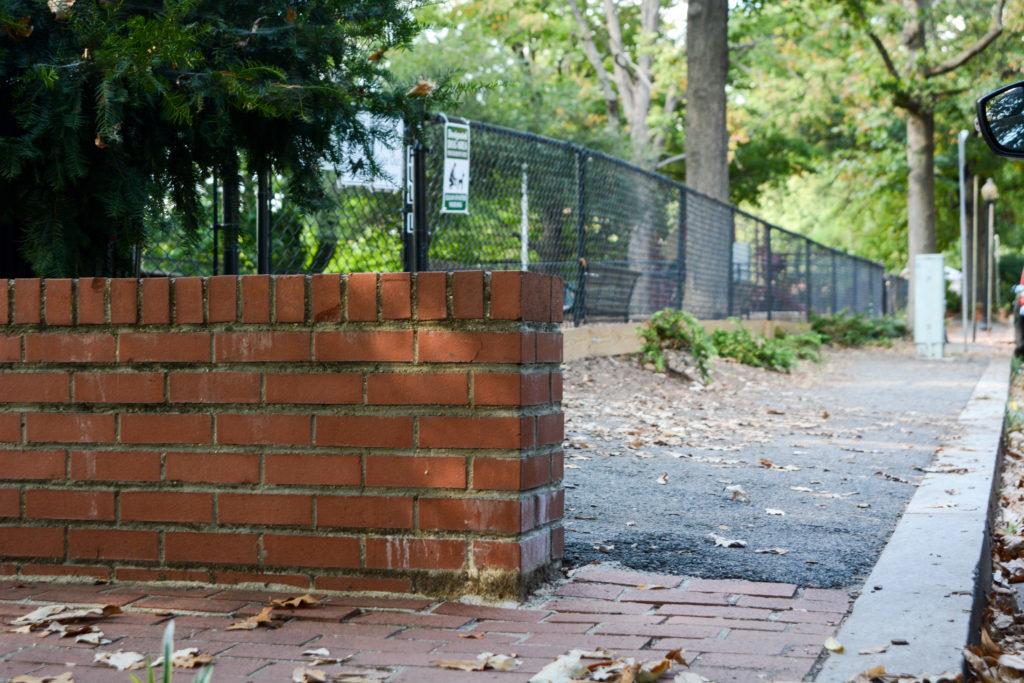A development company aims to fund at least $700,000 in neighborhood improvements in Foggy Bottom as part of its plan to build a major GW-owned development property on Pennsylvania Avenue.
Boston Properties, which is leading the planned commercial and retail redevelopment of 2100 Pennsylvania Ave., plans to fund five projects to spruce up local parks and improve the Foggy Bottom Metro station as part of its proposal to secure zoning changes needed for the project, David Avitabile, a real estate lawyer representing the company, said at a neighborhood meeting last week. The proposed projects, which include adding artwork, building sidewalks and increasing maintenance of several small public spaces in Foggy Bottom, would revitalize parks in the area, community leaders said.
Jake Stroman, an assistant project manager at Boston Properties, said developers occasionally fund community-requested projects when looking to attract official approval for planned properties. The company wants the Zoning Commission to adjust some of its current regulations to increase its flexibility in designing the 2100 Pennsylvania Ave. complex, according to its proposal submitted to the commission Friday.
Boston Properties will also need to adjust GW’s Campus Plan, which determines where new buildings can be constructed on campus and now designates Rice Hall as an academic or administrative building. The Zoning Commission will hold a hearing to consider the changes next month.
The company decided which community projects to support after speaking to neighbors and the Foggy Bottom and West End Advisory Neighborhood commission over the past several months, Stroman said.
“We believe these improvements will make a difference to all in this neighborhood – residents, students and those that work here,” he said in an email.
Boston Properties plans to merge the current building at 2100 Pennsylvania Ave. and Rice Hall – GW’s administrative headquarters – into a 450,000 square foot investment property generating revenue for GW. Officials announced last week that faculty will begin to move out of various buildings to allow administrators to vacate Rice Hall by late 2018.
About half of the allocated money from Boston Properties will fund improvements to the entrance of the Foggy Bottom Metro station that will be identified in a planned feasibility study by the Washington Metropolitan Area Transit Authority this fall. Once WMATA determines how the station can be revamped, Boston Properties will hold community discussions about funding the project, according to the proposal.
Neither WMATA nor Boston Properties has released details about exactly what the study will examine.
Residents and officials have long requested adding a second entrance to the station, but WMATA has no plans to construct one at this time, Avitabile said during last weeks meeting.
Marina Streznewski, the president of the Foggy Bottom Association, said the amenities package is the most extensive set of proposals from a development company that she has seen.
“It’d be hard to find somebody in the community that was not happy about at least one of those projects,” she said.
Streznewski, one of the community members who worked with Boston Properties to identify improvement plans, said the proposed renovations to the 26th Street Park – particularly plans to redevelop its sidewalk to boost pedestrian safety – was one of her strongest recommendations.
Boston Properties plans to fund an extension of the sidewalk near the 26th Street Park, located between I and K streets, and to remove a brick wall obstructing a pedestrian pathway. The extension will need approval from various District agencies before work can begin, according to the proposal. The report does not say which agencies would need to approve it or when work could begin.
Boston Properties committed $30,000 to install artwork in Duke Ellington Park on New Hampshire Avenue, working with community non-profit the Golden Triangle BID and the National Park Service. The developer also aims to give at least $150,000 to work with NPS to add more greenery and furnishings in the small, grassy area located across the street from The Shops at 2000 Penn on I Street, Avitabile said during the meeting.
The developer plans to additionally dole out $20,000 to design a new working farm garden at the School Without Walls at Francis-Stevens to improve Food Prints, an educational program focused on nutrition and urban gardening and farming, Avitabile said.
Patrick Kennedy, the chairman of the Foggy Bottom and West End Advisory Neighborhood Commission, said the changes would bring life to the public spaces that neighbors and visitors travel through every day and increase their appeal as places for the community to gather.
“Public spaces are the heart of any neighborhood, and many of the ones they identified for improvement are nodes for their particular part of the neighborhood,” he said in an email.




